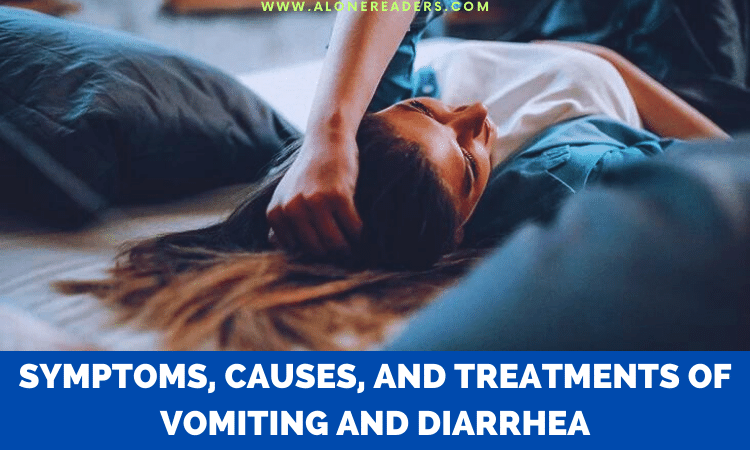
The frequent illnesses of vomiting and diarrhea can occur for a variety of causes. Although they might also arise as a result of infections or drugs, symptoms can occasionally be brought on by medical conditions. They may be brought on by a little sickness and are not necessarily cause for concern when they do occur. If that's the case, managing the symptoms with medicine and keeping a close eye on your symptoms will help you get by until they pass. The potential for dehydration makes common, severe vomiting and diarrhea cause an ER visit occasionally.
Depending on the reason, vomiting and diarrhea can have a variety of symptoms.
Vomiting Symptoms Include:
Symptoms of Diarrhea can Include:
Vomiting and diarrhea can be caused by a wide variety of diseases and situations, including infections, stress, and inflammatory bowel disease (IBD). Such included:
Gastroenteritis
Vomiting and diarrhea are most frequently brought on by gastroenteritis. It is frequently referred to as a "stomach bug" since a pathogen, such as a virus or bacteria, usually causes it.
Although gastroenteritis is often not serious, it can be fatal in older people, small children, and people who live in impoverished areas.
Food Poisoning
When you consume food that hasn't been cooked properly or that is infected with an infectious germ, you risk getting food poisoning. The bacteria and yeast that most frequently cause foodborne disease are:
Medications
While the body becomes used to the new chemical, some medications have a side effect that causes vomiting and diarrhea. Medications that can cause vomiting and diarrhea include:
Psychological Stress or Anxiety
The gut and the mind work together. Your body changes physiologically in response to stress or worries to get you ready to either fight the threat or run away. It is referred to as the fight-or-flight reaction.
The transmission between the stomach and brain might produce contractions in the digestive system during that response in the body, which can result in vomiting and diarrhea.
Inflammatory Bowel Disease
When the GI system becomes inflamed as a result of an autoimmune disease, IBD occurs. IBD can be classified as either Crohn's disease or ulcerative colitis. The inflammation can cause damage to the GI system, which includes the stomach, esophagus, and intestines, and this results in symptoms.
Crohn's disease, which can develop anywhere in the GI tract, is the kind of IBD most frequently linked with vomiting and diarrhea. On the other hand, ulcerative colitis only affects the colon and is frequently accompanied by diarrhea.
Treatment for vomiting and diarrhea frequently depends on the underlying cause. No matter the cause, however, some tried-and-true treatments are often used to control both.
Natural Treatments for Vomiting
The following options are available to those who want to adopt a more natural strategy:
Vomiting Remedies
Vomiting can be treated in a variety of ways. They include both prescription drugs and therapies derived from nature. Among the medications used to treat vomiting are:
Although certain medications are used off-label, which means they aren't intended to treat vomiting, they can nevertheless assist in reducing it. Some off-label options are:
Diarrhea Remedies
The goal of diarrhea treatments is to reduce the amount of water that enters the intestines and to delay digestion. Among the available medications are:
Additionally, eating certain foods or using nutritional supplements could reduce or control occurrences of diarrhea. A few options are:
The best way to treat children who have vomiting and diarrhea is to keep an eye on their symptoms and make sure they're getting enough fluids to prevent dehydration.
You can reintroduce bland foods once the youngster is able to consume liquids without throwing up or experiencing further diarrhea. The following items are included in the BRAT diet, which is frequently advised for kids:
Certain drugs used to treat vomiting and diarrhea in adults cannot be given to children without risk.
Children's Gravol and other drugs are available to treat children's vomiting and diarrhea, but they are not always necessary. Before giving your child medicine they might not need, it's critical to determine the cause with a doctor.
Because most occurrences of vomiting and diarrhea cannot be prevented, prevention is not always simple. For example, you cannot stop an illness from occurring if you have IBD or contract food poisoning.
There are several diseases or infections that can enhance your risk of avoiding vomiting and diarrhea:
When they happen only once, minor vomiting and diarrhea might not be a cause for concern. But if either condition lasts, it may cause severe dehydration and call for immediate medical attention. A need for immediate medical attention may be indicated by the following signs:
Final Word
Diarrhea and vomiting are very common. It's crucial to keep an eye on symptoms in children and avoid giving them any medications until you've consulted with a healthcare professional. Since many of the medications adults use to treat vomiting and diarrhea cannot be given to children, a new treatment strategy must be used.
The causes of vomiting and diarrhea make it difficult to prevent these symptoms. However, you can defend against bacterial or viral infections by maintaining proper personal cleanliness and making sure your food is always cooked. If you encounter vomiting or diarrhea for more than two days, consult your doctor.